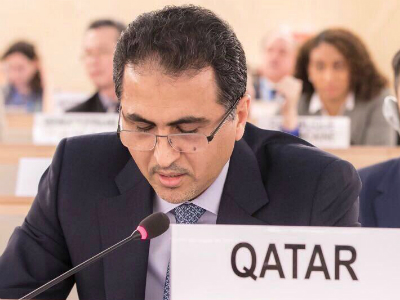Qatar Stresses Need to Strengthen International Solidarity to Address COVID-19 Challenges

Geneva / Information Office / September 14
The State of Qatar underlined the need to strengthen the international solidarity and collective action to ensure an urgent and effective response to address the consequences and challenges imposed by the coronavirus (COVID-19) pandemic.
Addressing the enhanced interactive dialogue on COVID-19 during the 45th session of the Human Rights Council, HE Permanent Representative of the State of Qatar to the United Nations Office in Geneva, Ambassador Ali Khalfan Al Mansouri, said that the COVID-19 pandemic has gone beyond being a global health crisis, threatening the progress that has been made over the past decades in many areas, including those related to the protection and promotion of human rights. In this regard, he stressed the necessity of strengthening international solidarity and collective action to ensure an urgent and effective response to address the consequences and challenges posed by this pandemic.
HE Ambassador Al Mansouri noted that the State of Qatar's strategy to confront the pandemic was based on three basic pillars. The first is to protect all residents in the country without discrimination and to provide them with appropriate medical care, in addition to taking many measures and procedures to protect expatriate workers and ensure that they obtain all their rights. The second pillar aims at mitigating the economic and social impacts by providing support, exemptions and financial incentives to various economic sectors in the country, while the third is to fulfill Qatar's international commitment to facing this pandemic by providing financial and humanitarian contributions to many international organizations, in addition to 78 countries, with an amount reaching more than $88 million, despite the illegal blockade imposed on the country and the closure of airspace and land and sea borders by the blockading countries.
HE Ambassador Al Mansouri stressed the importance of ensuring that all individuals have the right to safe, prompt and fair access to the initial doses of vaccines upon reaching them, and that those vaccines be available to all without discrimination.

